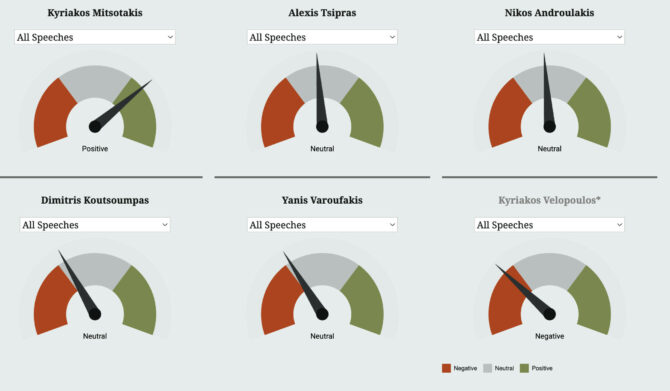A slight rise in polarizing rhetoric and migration crisis mentions in political leaders’ discourse after the tragedy off the coast of Pylos
The findings from the analysis of political speeches in the first round of elections in May, 21st 2023

See the analyses of all the speeches of the leaders of the parliamentary parties before the elections of 21 May 2023.
We are in the final stretch for the 25 June elections. The political parties are preparing the last events that will bring the curtain down on this election period. In this paper, we examine the speech strategies of political leaders at the peak of the election period, between 12-20 June. During the same period, the country was shaken by the tragic shipwreck off the coast of Pylos after the capsizing of a fishing boat carrying hundreds of migrants. Dozens are already officially confirmed dead and hundreds missing. The caretaker government has declared a three-day national mourning period and the election activity of political parties has been suspended from Wednesday 14 June to Friday 16 June. In the analysis, we will attempt to discern whether there are variations in the rhetoric of political leaders and whether they are linked to the course of the election year or to this tragic event – even though the migration crisis did not seem to be a key issue on the election agenda throughout the previous period.
The trends that have been observed in terms of the sentiment conveyed in the speeches of all political leaders remain unchanged in this period as well: Kyriakos Mitsotakis’ speeches are all firmly in the positive spectrum, the speeches of Alexis Tsipras, Nikos Androulakis and Dimitris Koutsoumpas are located within the neutral spectrum and only those of Kyriakos Velopoulos are in the negative spectrum. This finding – as an overall picture of the speeches – is consistent throughout the election period.
Polarization patterns in Mitsotakis’ speech regarding the migration crisis and squeezing of smaller parties towards the right of New Democracy
In terms of the polarization index, a slight overall increase is observed in the use of polarizing speech patterns among political leaders. Almost all leaders exhibit a slight rise in polarizing discourse, albeit starting from different positions. Notably, Kyriakos Mitsotakis introduces the use of polarization schemes for the first time in this election period, revolving around two key aspects: a) contrasting with SYRIZA regarding immigration policy, and b) specific mentions of smaller parties being squeezed towards the right of New Democracy. Alexis Tsipras maintains similar levels of polarizing discourse, with a notable escalation in his speech in Ioannina. Nikos Androulakis shows no significant differentiation in his measured use of polarizing speech patterns. Dimitris Koutsoumpas consistently employs the highest levels of polarizing discourse compared to other political leaders, with his speech at the event organized by the KKE’s Attica Party Organization exhibiting the highest levels of polarizing discourse in the current election period. Additionally, there is also an observed increase in the use of polarizing speech patterns by Kyriakos Velopoulos during this period.
When it comes to populism, the overall situation is quite the opposite.The utilization of populist discourse patterns remains low (even lower than in the previous election period) and no significant differentiation is observed in this specific period under study. Kyriakos Mitsotakis and Alexis Tsipras continue their election campaigns without resorting to populist discourse. Nikos Androulakis occasionally employs isolated instances of populist discourse, primarily when contrasting the interests of the powerful or oligarchs with those of the people and the low/middle classes. Apart from his polarizing speech at the KKE’s Attica Party Organization, Dimitris Koutsoumpas avoids using populist discourse in his other speeches. Similarly, no use of populist discourse is detected in Kyriakos Velopoulos’ speeches.
How we analyze the campaign speeches of political leaders

The working methodology for analyzing campaign speeches in the project -from data collection to data analysis.
Detecting polarization in the pre-election political discourse in Greece

Differentiating competition, division and polarisation in political discourse.
Mitsotakis’ speech maintains a programmatic approach, while Tsipras shifts focus towards the agenda rather than criticism
In full alignment with the positive sentiment conveyed in his speeches, Kyriakos Mitsotakis maintains a consistent and overwwhelmingly programmatic political discourse as the second election period draws to a close. In contrast, Tsipras’ speech displays signs of a shift towards a more programmatic focus during the current election period. Of his speeches, five predominantly revolve around the party’s agenda, while two allocate more attention to criticizing opponents. Nikos Androulakis maintains a relatively programmatic speech style, positioning himself strategically between the two main contenders. Dimitris Koutsoumpas places slightly more emphasis on criticism, following a pattern similar to the first election period. In line with the negative sentiment conveyed in his previous speeches, Kyriakos Velopoulos stands out as the only candidate who strongly emphasizes criticism and displays a lower degree of programmatic discourse.
Mitsotakis’ criticism of his political opponents centers on the migration crisis, while Tsipras’ criticism focuses on issues of democracy
Regarding the current issues addressed by the political leaders, we can observe some differences. Kyriakos Mitsotakis has been focusing on topics such as health, the welfare state, the economy, and infrastructure in his speeches until June 13. These topics align with the core thematic trio of “health-economy-labor” that characterizes his longstanding electoral presence. However, after the resumption of electoral activity on June 17, the migration crisis has emerged as a new topic in his discourse. It has become part of his programmatic agenda, but mostly, it is a focal point for his criticism of political opponents. While his criticism remains limited, the focus is primarily on immigration policy following the end of the national mourning period. In his initial speech in Gythio, a significant portion of his criticism (84%) is dedicated to this topic. Nonetheless, he continues to prioritize the economy and health as the main themes of his speech. This pattern persists for the first three days but gradually diminishes, starting with his recent speech in Polygyros, Halkidiki.
On the contrary, Alexis Tsipras’ speeches do not exhibit a similar change. The migrant crisis does not hold a prominent position in the election speeches of SYRIZA’s president, even after the Pylos shipwreck incident. However, a new topic has emerged during this period, marking a distinction from the preceding weeks of the pre-election period, and that is democracy. Tsipras primarily associates this topic with two key issues: a) his criticism of the authoritarian approach adopted by New Democracy and Kyriakos Mitsotakis, and b) the debate surrounding the electoral behavior of the minority in Rhodope. In addition to this, the central themes in Tsipras’ speeches continue to revolve around health and the economy, as observed in the previous period, with specific local emphases on subjects such as tourism during his visit to Heraklion or agricultural policy in Giannitsa. The topic of democracy has become a significant aspect of his critique.
Economy takes center stage in Androulakis’ speeches, the migration crisis as key issue in Koutsoumpas’ criticism
The economy is the most central issue that Nikos Androulakis addresses in his speeches, both as a programmatic pillar and as a point of criticism. Education and housing are also important themes in his programmatic discourse, while his criticism extends to topics such as democracy and transparency. We do not see the migration crisis entering the main agenda of the speeches of the rresident of PASOK either.
On the contrary, the migration crisis becomes one of the main issues in the discourse of Dimitris Koutsoumpas in all his speeches after the three days of national mourning. In these speeches, he puts forward the KKE’s proposals on the issue and harshly criticizes the other parties for the country’s immigration policy in recent years. Other issues raised at this time are labor, health and the economy, the main issues of the election period, that is. Notably, the migration crisis enters Kyriakos Velopoulos’ agenda for the first time
Tsipras mentions Mitsotakis and the healthcare system the most in speeches
In Alexis Tsipras’ speech, two main references stand out: frequent mentions of Kyriakos Mitsotakis and the healthcare system. Unlike Mitsotakis, Tsipras specifically addresses his political opponents by name. Nikos Androulakis continues to refer to both Mitsotakis and Tsipras by name, along with regular mentions of PASOK founder Andreas Papandreou. Tsipras has regained his position as the politician who mentions Mitsotakis the most. Dimitris Koutsoumpas focuses on social references to workers, emphasizing the KKE’s representation, and regularly mentions the European Union and NATO.
In conclusion, as the second electoral period draws to a close, it reflects a combination of consistent party strategies and distinct differentiations that can be summarized as follows: a) The sentiment conveyed in the speeches remains unchanged. Kyriakos Mitsotakis’ discourse consistently maintains a programmatic approach, focusing on his agenda and policy proposals. This pattern is also observed among other political leaders, who similarly balance their programmatic agenda with criticism of their opponents.
b) As we approach the final stretch, there is a slight increase in the use of polarizing speech patterns, while populist discourse remains extremely low during the current election period.
c) After the tragic shipwreck off Pylos, migration becomes a central issue for Kyriakos Mitsotakis, Dimitris Koutsoumpas, and Kyriakos Velopoulos, but it is absent from the speeches of Alexis Tsipras and Nikos Androulakis.
